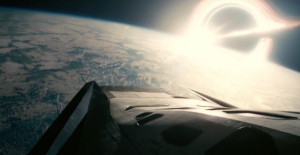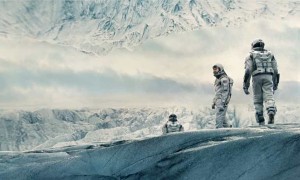In a nutshell: Science fiction epic gets the science correct, but more importantly, is an emotional tearjerker that occasionally stumbles over its best intentions. Even so, it is a worthwhile viewing and a terrific entertainment.
The Spoiler Alert: There may be descriptions forthcoming that will alter your viewing experience of the film. This is your last warning.
Are we all in then?
 The worst problem with the film Interstellar is not the cast, all of which does a remarkable job with some occasionally confusing material. The effects are solid, mostly. The music by Hans Zimmer is appropriately gripping. And that “worst problem” isn’t really co-writer/director Christopher Nolan, but instead is the baggage he brings with him.
The worst problem with the film Interstellar is not the cast, all of which does a remarkable job with some occasionally confusing material. The effects are solid, mostly. The music by Hans Zimmer is appropriately gripping. And that “worst problem” isn’t really co-writer/director Christopher Nolan, but instead is the baggage he brings with him.
But let’s not get ahead of ourselves. Interstellar takes place in a near future where Earth’s days as an inhabitable planet are numbered. Astronaut Joseph Cooper (Matthew McConaughey) is called upon for a mission, indeed the last mission he will probably ever take, to journey through the farthest reaches of space to find a hospitable planet for the human race to colonize. In doing so, he must leave daughter Murphy and son Tom behind. Murphy (Mackenzie Foy and later Jessica Chastain) does not want him to go, but Cooper knows that if the mission is to succeed, he must be a part of it…and if the mission does not succeed, his family, his farm house and his species will all die.
The film is in part about this small cluster of astronauts on the search for that elusive hospitable second Earth. More than that, the film is about the price of parenthood, writ large. Cooper is wracked with guilt for his presumed abandonment of his family, for the resentment Murphy feels toward him, and the understanding that even if he succeeds, he will never see them again. Space and time are the same thing. The farther Cooper and fellow members travel, the “slower” their time will be. To them, a day is a day. Back on Earth, years are going by. Even though Cooper has promised his kids that he would return, they would likely have died from old age by then, not via Earth’s calamitous demise. Is love staying with your children onto the edge of death, or is it leaving them behind in an attempt to avert it?
 Only later in the movie would Murph’s “haunting” by ghosts make sense. Between then and when the truth is revealed, she will become a scientist and will learn things about her father’s mission that will add even more tension to the plot.
Only later in the movie would Murph’s “haunting” by ghosts make sense. Between then and when the truth is revealed, she will become a scientist and will learn things about her father’s mission that will add even more tension to the plot.
Interstellar is a long movie, probably too long to sustain some of the ideas and suspense it tries to work out, but if your eyes aren’t just a little bit wet when you get to the third act’s big reveal, you’re far more of a stoic than I am and nothing about the film with get to you.
So what about Christopher Nolan’s baggage? He rode a wave of critical and audience adoration for many years, culminating in the one-two punch of The Dark Knight and Inception. He has been brought back down from such lofty heights since The Dark Knight Rises, as disjointed as that film was. The major problem with that film was that, after Heath Ledger’s remarkable performance in The Dark Knight as The Joker, there was nowhere left to go. Everything that could be said about the shared pathology of heroes and villains had been said, and in comparison Tom Hardy’s Bane was always going to be a lesser villain no matter how pumped up he was. The Dark Knight Rises was, in most respects, a more conventional superhero movie.
 And Interstellar is, in many ways, a conventional family drama set against an extraordinary backdrop. That thread carries through to the story of one of Cooper’s fellow travelers Amelia Brand (Anne Hathaway), the daughter of the scientist who worked out this expedition in the first place, played by Nolan regular Michael Caine. Distanced by the pedigree of the filmmakers — or in this case the primary filmmaker — I think the movie would have been received better by the public. With the burden of being a Christopher Nolan enterprise, and with the lingering aftertaste of The Dark Knight Rises‘ disappointment, perhaps the audience was a tad more prejudiced?
And Interstellar is, in many ways, a conventional family drama set against an extraordinary backdrop. That thread carries through to the story of one of Cooper’s fellow travelers Amelia Brand (Anne Hathaway), the daughter of the scientist who worked out this expedition in the first place, played by Nolan regular Michael Caine. Distanced by the pedigree of the filmmakers — or in this case the primary filmmaker — I think the movie would have been received better by the public. With the burden of being a Christopher Nolan enterprise, and with the lingering aftertaste of The Dark Knight Rises‘ disappointment, perhaps the audience was a tad more prejudiced?
The Blu-ray looks remarkable, but for those who are annoyed when the film frame aspect ratio flips from the 2:35.1 widescreen to the IMAX-range 1:85.1, and back, be aware that it happens a lot with this film. I was too caught up in the story to get thrown by it, but you might be disoriented by it.
It isn’t a perfect film. There are several times where the science trips up the drama, and other times when the drama lapses into melodrama, and still other times when things resolve far too conveniently to be fully bought into. Yet Interstellar is still, in my mind, one of the better movies to come out of 2014, and I dare say that in time it will probably gain more admirers than it could lose. It is definitely worth the 169 minutes spent watching it, and I’d say investing in the Blu-ray is a good purchase as well, especially for some of the extremely creative set pieces. My advice is to forget it is a (THRUMM THRUMMMM) Christopher Nolan Movie and enjoy it as it is.
A post-script: You might be tempted to buy the Blu-ray strictly for the collectable “IMAX film frame” packaged with it. If that is your main reason for the purchase, I’d advise you think again. My film frame was black. Just black. An interesting idea, but Paramount’s quality control was awful in this regard. (Thanks, Paramount Home Video!) Lesson learned — buy the movie for the movie, not the gimmicks added to it.





Comments